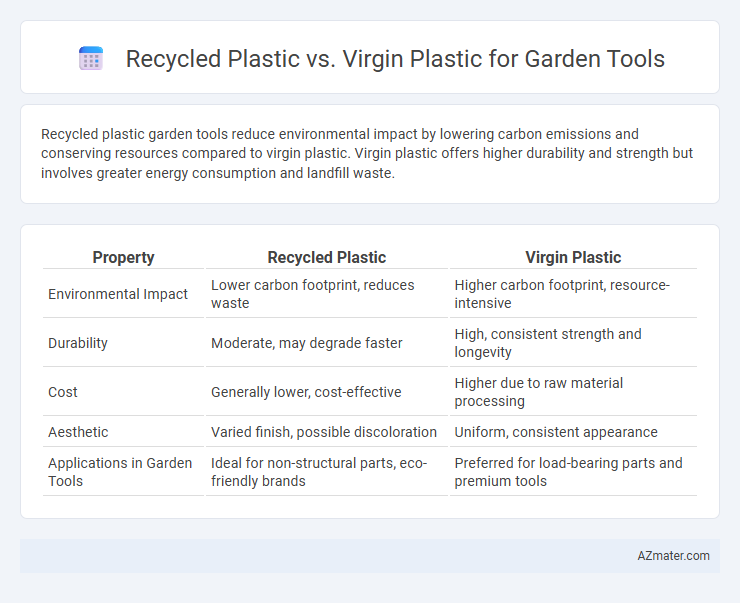Recycled plastic garden tools reduce environmental impact by lowering carbon emissions and conserving resources compared to virgin plastic. Virgin plastic offers higher durability and strength but involves greater energy consumption and landfill waste.
Table of Comparison
| Property | Recycled Plastic | Virgin Plastic |
|---|---|---|
| Environmental Impact | Lower carbon footprint, reduces waste | Higher carbon footprint, resource-intensive |
| Durability | Moderate, may degrade faster | High, consistent strength and longevity |
| Cost | Generally lower, cost-effective | Higher due to raw material processing |
| Aesthetic | Varied finish, possible discoloration | Uniform, consistent appearance |
| Applications in Garden Tools | Ideal for non-structural parts, eco-friendly brands | Preferred for load-bearing parts and premium tools |
Introduction to Plastic Choices in Garden Tools
Recycled plastic garden tools offer enhanced sustainability by reducing waste and conserving resources compared to virgin plastic, which relies on new petrochemical inputs. Virgin plastic provides consistent quality and durability but has a higher environmental footprint due to energy-intensive production processes. Choosing recycled plastic supports eco-friendly gardening practices while maintaining functional performance in everyday garden tools.
What is Recycled Plastic?
Recycled plastic is material made from reprocessing used plastic products to create new items, reducing waste and conserving resources. In garden tools, recycled plastic offers sustainability benefits by minimizing landfill impact and lowering carbon emissions compared to virgin plastic derived directly from petrochemicals. The durability and performance of recycled plastic in garden tools can be comparable to virgin plastic when properly engineered, making it a viable eco-friendly alternative.
Understanding Virgin Plastic: Definition and Uses
Virgin plastic is a type of plastic made directly from petrochemicals without any prior processing or recycling, ensuring consistent quality and performance. It is widely used in garden tools due to its durability, strength, and resistance to environmental factors such as UV radiation and moisture. Manufacturers often prefer virgin plastic for components requiring high structural integrity and long-lasting functionality in outdoor settings.
Environmental Impact: Recycled vs Virgin Plastic
Recycled plastic garden tools significantly reduce environmental impact by lowering greenhouse gas emissions and decreasing the demand for fossil fuel extraction compared to virgin plastic. The production of recycled plastic consumes less energy and diverts plastic waste from landfills and oceans, promoting a circular economy. Virgin plastic manufacturing releases higher carbon emissions and contributes to resource depletion, making recycled options more sustainable for eco-friendly gardening.
Durability Comparison: Recycled Plastic vs Virgin Plastic Tools
Recycled plastic garden tools often exhibit slightly lower durability compared to virgin plastic tools due to potential variations in material consistency and strength. Virgin plastic garden tools provide superior resistance to wear, impact, and environmental factors like UV exposure, ensuring longer lifespan and better performance in demanding garden tasks. However, advancements in recycling technology are narrowing the durability gap, making recycled plastic an increasingly viable option for eco-friendly garden tools.
Cost Analysis: Which is More Affordable?
Recycled plastic garden tools typically cost 20-30% less than virgin plastic counterparts due to lower raw material expenses and reduced processing energy requirements. Virgin plastic tools, while often more durable, incur higher production costs driven by the extraction and refining of new polymers. For budget-conscious consumers, recycled plastic offers a more affordable option without significantly compromising quality.
Performance and Functionality in the Garden
Recycled plastic garden tools often exhibit comparable durability and resistance to weathering as virgin plastic, enabling effective performance in various gardening tasks. Virgin plastic tends to offer higher tensile strength and consistency in molding, which can enhance precision and longevity under heavy-duty use. Both materials perform well in moisture resistance and UV stability, but advances in recycled plastic technology have significantly closed the gap in functionality and reliability for garden applications.
Aesthetics and Design Options
Recycled plastic garden tools offer diverse aesthetics with unique color variations and textures resulting from mixed material sources, providing a distinctive, eco-friendly appearance. Virgin plastic allows precise control over color uniformity, finish, and mold intricacy, enabling sleek, consistent designs tailored to high-end or specialized garden tools. Both materials support innovative design options, but recycled plastic emphasizes sustainable appeal while virgin plastic excels in fine detailing and surface smoothness.
Sustainability and Eco-Friendliness
Recycled plastic garden tools significantly reduce environmental impact by lowering carbon emissions and conserving natural resources compared to virgin plastic counterparts. Utilizing recycled materials diverts plastic waste from landfills and oceans, promoting a circular economy in the gardening industry. These tools maintain durability and performance while advancing sustainability and eco-friendliness in outdoor product choices.
Choosing the Best Plastic for Your Garden Tools
Garden tools made from recycled plastic offer eco-friendly benefits by reducing waste and conserving resources, while virgin plastic ensures higher durability and consistent quality essential for heavy-duty use. Recycled plastic can be more cost-effective and environmentally sustainable but may vary in strength and longevity compared to virgin alternatives. Selecting the best plastic depends on balancing durability needs, environmental impact, and budget considerations specific to your gardening tasks.

Infographic: Recycled plastic vs Virgin plastic for Garden tool
 azmater.com
azmater.com